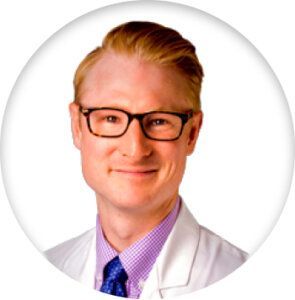Age-Related Macular Degeneration | FAQs with Dr. Adam Carrera
Recently, Dr. Adam Carrera answered patients’ questions about age-related macular degeneration on an Ask Me Anything session that we premiered on our Facebook page ! We’ve written down the answers that he provided to your questions so you can reference them at any time.
What is age-related macular degeneration?
There are two main types of macular degeneration — dry and wet. As the name implies, it involves a breakdown or degeneration of the layers in the back of the eye where the retina is, as well as the cells that make that up. It also involves deposits of a protein called “drusen” that collects within the macula.
breakdown or degeneration of the layers in the back of the eye where the retina is, as well as the cells that make that up. It also involves deposits of a protein called “drusen” that collects within the macula.
Dr. Carrera explained that the macula is where you get your central vision . To understand central vision, imagine that you’re looking at the face of a clock. Central vision would be the center of the clock while the numbers and hands would be your peripheral vision. Age-related macular degeneration, or AMD for short, causes central vision loss.
Dry macular degeneration is far and away the most common form of AMD. 80-85% of patients have dry AMD, but severe vision loss doesn’t usually occur until much more advanced stages. Wet AMD , or exudative AMD , is when patients grow blood vessels beneath the retina, resulting in bleeding and scarring. Wet AMD is rarer but associated with more severe vision loss.
How do I know if I’m at risk for AMD?
There are a lot of risk factors associated with AMD. As the name implies, people further along in life are at higher risk for the disease. People around the age of 75 have a 3x higher risk of developing AMD than someone in their mid-60s.
Smoking is a big risk factor, but one that you can avoid. It can give you a two-fold risk of worse vision and developing macular degeneration. According to Dr. Carrera, it’s best to quit smoking if you already do or never starting to begin with.
Family history is another important indicator of developing AMD. You are at much greater risk if you have parents, grandparents, or aunts and uncles that have also had age-related macular degeneration.
Other risk factors include:
- Being female
- Being caucasian
- Having high cholesterol
- Having hypertension/high blood pressure
- Being obese
- Being farsighted
- Having light-colored eyes
What are the treatment options for AMD?
Unfortunately, there currently isn’t a cure for AMD, but treatment options are available. When it comes to treatment options, Dr. Carrera says that it will depend on the type of AMD that you have and how far it’s progressed. Your eye doctor will use these factors to determine which treatment is best for you, which may include:
- A regimen of antioxidant vitamins
- Laser therapy
- Medication
- Surgery
- Low-vision aids
- Retinal translocation
What can you do if you’re genetically more likely to develop AMD?
Based on our current understanding of AMD, there are some genes that have been targeted that have indicated a higher likelihood of developing it. Therapies are being researched that can potentially target patients with a higher risk due to family history. This is still an evolving research field and not a lot is known about what it will involve.
Mutations or genetic predisposition doesn’t necessarily mean you’re guaranteed to develop AMD. However, it does mean that it’s something you should be aware of as you get older. Start following that around the age of 50 with comprehensive eye exams. Your eye doctor will want to follow up every year or two years to keep a lookout for complications due to AMD.
It’s possible to have AMD without realizing it in the early stages. Dr. Carrera says that’s why it’s so important to be getting regular screenings early on to catch
You can’t help your sex or your race, but you can definitely stop smoking. Some research has shown that smoking cessation decreases your risk and that 10 years of non-smoking reduces your risk to that of the average population.
Work with your primary doctor to control your blood pressure and cholesterol . Make sure to wear sunglasses to protect the back of your eyes from UV damage. It’s also important to eat a diet full of colorful veggies and leafy greens.
I’ve been diagnosed with macular degeneration recently. Besides vitamins, what can help slow its progression? I also have dry eyes and OTCs aren’t much help.
Let’s work our way through that scenario. If your doctor finds you have AMD then they may recommend eye vitamins depending on the stage and severity of the disease. These go by different brand names, but they’re based on the AREDS Studies which found that the right vitamins can slow AMD’s progression.
A lot of patients with dry AMD will be put on this treatment. Unfortunately, there is currently no cure for AMD. Your main focus will be on vitamins and reducing risk factors like smoking, controlling blood pressure, lowering your cholesterol, and eating healthier.
If a patient does develop blood vessels beneath the retina then they’ll need to see a retinal specialist or someone who manages that disease. They’ll administer medication via injection to help the abnormal blood vessels go away. This will resolve bleeding and other complications of wet AMD. Some providers may use a laser.
Dr. Carrera absolutely recommends the vitamins if your doctor has suggested them. He also strongly recommends reducing any factors you can control.
There are a lot of factors that can lead to dry eye . Talk to your healthcare provider first and have them evaluate your condition. There are other options besides over-the-counter treatment like medicated eye drops, so don’t lose hope there.
How much does eye surgery cost?
There are many different eye surgeries so it can be hard to give a specific number. Those numbers are always changing so it’s best to talk to your surgeon and see what they say.
What are your recommendations for managing AMD?
According to Dr. Carrera, this will depend on the severity of your condition and the type you have. The more severe, the more often you’ll need to see your eye doctor. If you’re in the early stages then you may only need yearly follow-ups. Those with wet AMD will require closer observation, so it depends on a lot of variables.
The most important thing is to be an advocate for yourself by monitoring your condition on your own time. One of the best things you can use is an Amsler grid. To use an Amsler grid:
- Cover one eye once per day
- Look at the grid
- Look for any changes in your vision
This could be wavy lines, spots missing from the grid, parts of the grid becoming blurred just to name a few. This could indicate progressing from dry to wet AMD or another important change.
Are you concerned that you have ADM? Contact us today to schedule your comprehensive exam!
Baptist Eye Surgeons is an ophthalmological practice in Knoxville, TN, and Morristown, TN. Give us a call at 865-579-3920 for more information or to schedule an appointment.





